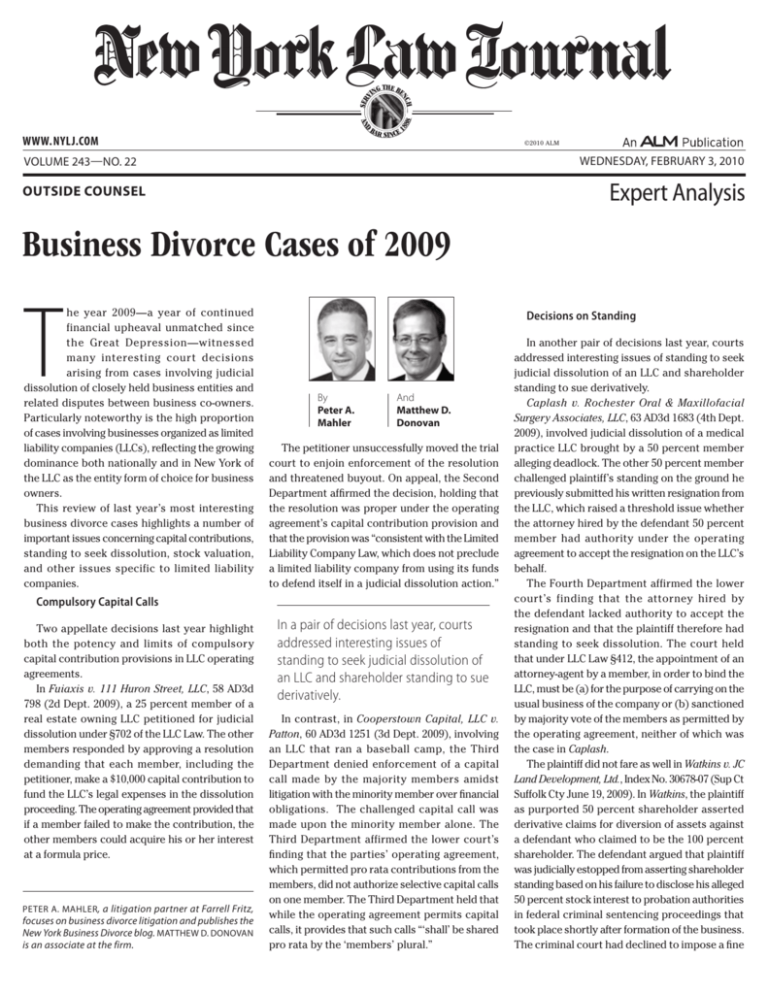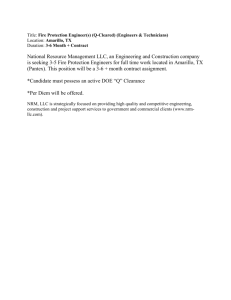
AND
88
8
SER
V
H
NC
THE BE
ING
1
BA
R SINCE
www. NYLJ.com
©2010 ALM
wednesday, february 3, 2010
Volume 243—NO. 22
Expert Analysis
Outside Counsel
Business Divorce Cases of 2009
T
he year 2009—a year of continued
financial upheaval unmatched since
the Great Depression—witnessed
many interesting court decisions
arising from cases involving judicial
dissolution of closely held business entities and
related disputes between business co-owners.
Particularly noteworthy is the high proportion
of cases involving businesses organized as limited
liability companies (LLCs), reflecting the growing
dominance both nationally and in New York of
the LLC as the entity form of choice for business
owners.
This review of last year’s most interesting
business divorce cases highlights a number of
important issues concerning capital contributions,
standing to seek dissolution, stock valuation,
and other issues specific to limited liability
companies.
Decisions on Standing
By
Peter A.
Mahler
And
Matthew D.
Donovan
The petitioner unsuccessfully moved the trial
court to enjoin enforcement of the resolution
and threatened buyout. On appeal, the Second
Department affirmed the decision, holding that
the resolution was proper under the operating
agreement’s capital contribution provision and
that the provision was “consistent with the Limited
Liability Company Law, which does not preclude
a limited liability company from using its funds
to defend itself in a judicial dissolution action.”
Compulsory Capital Calls
Two appellate decisions last year highlight
both the potency and limits of compulsory
capital contribution provisions in LLC operating
agreements.
In Fuiaxis v. 111 Huron Street, LLC, 58 AD3d
798 (2d Dept. 2009), a 25 percent member of a
real estate owning LLC petitioned for judicial
dissolution under §702 of the LLC Law. The other
members responded by approving a resolution
demanding that each member, including the
petitioner, make a $10,000 capital contribution to
fund the LLC’s legal expenses in the dissolution
proceeding. The operating agreement provided that
if a member failed to make the contribution, the
other members could acquire his or her interest
at a formula price.
PETER A. MAHLER , a litigation partner at Farrell Fritz,
focuses on business divorce litigation and publishes the
New York Business Divorce blog. MATTHEW D. DONOVAN
is an associate at the firm.
In a pair of decisions last year, courts
addressed interesting issues of
standing to seek judicial dissolution of
an LLC and shareholder standing to sue
derivatively.
In contrast, in Cooperstown Capital, LLC v.
Patton, 60 AD3d 1251 (3d Dept. 2009), involving
an LLC that ran a baseball camp, the Third
Department denied enforcement of a capital
call made by the majority members amidst
litigation with the minority member over financial
obligations. The challenged capital call was
made upon the minority member alone. The
Third Department affirmed the lower court’s
finding that the parties’ operating agreement,
which permitted pro rata contributions from the
members, did not authorize selective capital calls
on one member. The Third Department held that
while the operating agreement permits capital
calls, it provides that such calls “‘shall’ be shared
pro rata by the ‘members’ plural.”
In another pair of decisions last year, courts
addressed interesting issues of standing to seek
judicial dissolution of an LLC and shareholder
standing to sue derivatively.
Caplash v. Rochester Oral & Maxillofacial
Surgery Associates, LLC, 63 AD3d 1683 (4th Dept.
2009), involved judicial dissolution of a medical
practice LLC brought by a 50 percent member
alleging deadlock. The other 50 percent member
challenged plaintiff’s standing on the ground he
previously submitted his written resignation from
the LLC, which raised a threshold issue whether
the attorney hired by the defendant 50 percent
member had authority under the operating
agreement to accept the resignation on the LLC’s
behalf.
The Fourth Department affirmed the lower
court’s finding that the attorney hired by
the defendant lacked authority to accept the
resignation and that the plaintiff therefore had
standing to seek dissolution. The court held
that under LLC Law §412, the appointment of an
attorney-agent by a member, in order to bind the
LLC, must be (a) for the purpose of carrying on the
usual business of the company or (b) sanctioned
by majority vote of the members as permitted by
the operating agreement, neither of which was
the case in Caplash.
The plaintiff did not fare as well in Watkins v. JC
Land Development, Ltd., Index No. 30678-07 (Sup Ct
Suffolk Cty June 19, 2009). In Watkins, the plaintiff
as purported 50 percent shareholder asserted
derivative claims for diversion of assets against
a defendant who claimed to be the 100 percent
shareholder. The defendant argued that plaintiff
was judicially estopped from asserting shareholder
standing based on his failure to disclose his alleged
50 percent stock interest to probation authorities
in federal criminal sentencing proceedings that
took place shortly after formation of the business.
The criminal court had declined to impose a fine
wednesday, february 3, 2010
against plaintiff upon its finding that he had no
assets.
Supreme Court agreed with defendant and
granted summary judgment dismissing the action,
stating that “the Court cannot imagine a more
apt scenario for application of the doctrine of
judicial estoppel” and that “[t]he same litigant
will not be permitted to utilize the State Court
system to litigate his claims to real property or
accountings based on funds he now states he
began transferring at the precise time of his
contradictory statements to probation, relied
upon by a federal judge.”
Valuation Cases
A threesome of decisions from last year
addressed novel issues in the context of
valuation disputes arising from the dissolution
of a professional corporation, the surviving
shareholders’ takeover of an accounting firm’s
assets, and a corporate merger.
In Matter of Ravitz (Gerard Furst and Marjorie
Ravitz, DPM, P.C.), 65 AD3d 1049 (2d Dept.
2009), in which the authors’ firm represented
the petitioner, one of two equal shareholders in
a podiatry practice petitioned under §1104 of the
Business Corporation Law (BCL) for dissolution
based on deadlock and internal dissension. After
the court granted the petition and dissolved the
corporation, the shareholders agreed to close one
of their three offices and that each would take
over one of the two remaining offices for their
new, separate practices. The respondent thereafter
unsuccessfully moved the trial court to conduct a
hearing to determine the alleged, greater value of
the goodwill associated with the office retained by
petitioner for purposes of compelling an adjusting
payment to respondent.
The Second Department affirmed the lower
court’s denial of the motion on the ground
that the court lacks statutory authority in BCL
§1104 proceedings to supervise post-dissolution
distribution of corporate assets, adding that
“[w]hen parties cannot reach an agreement
amongst themselves with respect to the sale of
the corporation’s assets either to one another or
to a third party, the only authorized disposition of
corporate assets is liquidation at a public sale.”
In Matter of Verdeschi, 63 AD3d 1084 (2d Dept.
2009), the estate of the deceased 35 percent
shareholder of an accounting firm brought a
dissolution proceeding in Surrogate’s Court
under BCL §1104-a alleging that the surviving
shareholders had reconstituted using a new entity
with an almost identical name, occupying the old
firm’s office and servicing its same clients. The
court granted dissolution and referred the issue
of valuation and appropriate remedy to a Judicial
Hearing Officer. The JHO held a two-day hearing
after which he adopted the appraisal of the estate’s
expert based on a multiple of adjusted gross
revenues. The JHO sharply rejected the testimony
of respondents’ expert who had assigned zero
value to the decedent’s stock interest.
In its decision affirming Surrogate’s Court’s
valuation award of $260,000 against respondents,
the Second Department wrote that “the judicial
hearing officer properly credited the testimony
of the administrator’s expert witness regarding
the value of the decedent’s share of the value of
the corporation, including the value of goodwill,
and properly rejected the testimony of the expert
testifying for the surviving shareholders.”
Matter of Jamaica Acquisition Inc., 25 Misc3d
1212(A) (Sup Ct Nassau Cty 2009), involved a
dissenting shareholder appraisal proceeding
under BCL §623 arising from the conversion of
A threesome of decisions from last
year addressed novel issues in the
context of valuation disputes arising
from the dissolution of a professional
corporation, the surviving shareholders’
takeover of an accounting firm’s assets,
and a corporate merger.
the former Green Bus Lines and related companies
into a real estate investment trust. The parties’
expert appraisers, whose respective valuations
varied by over 250 percent, clashed over a number
of issues including discounts for built-in capital
gains (BIG) and post-merger corporate tax
liabilities, marketability and minority discounts,
and appropriate capitalization rate.
Among other rulings, the court rejected the $58
million BIG discount proposed by the companies’
expert based on statements in the merger proposal
that the real estate would be held for at least 10
years. On the other hand, the court agreed with
the companies’ position applying a 25 percent
marketability discount against the entire value
of the enterprise and not against goodwill value
only, as some decisions have suggested. The
court also ordered the companies to reimburse
the dissenters 50 percent of their costs and legal
fees based on the significant discrepancy between
the companies’ $7 per share offer and the $11.69
per share award, and also due to the companies’
“vexatious” proffering of multiple, changing fair
value calculations even during trial.
Lawyers who follow LLC developments will
recall from 2008 the controversial 4-3 decision by
the New York Court of Appeals in Tzolis v. Wolff,
10 NY3d 100, recognizing a common law right of
LLC members to bring a derivative action despite
the apparent, deliberate omission of statutory
authority for such action when the LLC Law
was enacted. Last year, in Gottlieb v. Northriver
Trading Co., LLC, 58 AD3d 550 (1st Dept. 2009),
the First Department followed the path of Tzolis
and ruled that members of an LLC may seek an
equitable accounting under common law. The
decision reversed the lower court’s order which
relied, first, on the company’s compliance with
its obligations under LLC Law §1102 to provide
access to certain books and records and, second,
on the absence of statutory authority in the LLC
Law for the accounting remedy.
Finally, Ficus Investments Inc. v. Private Capital
Management, LLC, NYLJ March 5, 2009 (Sup Ct NY
Cty), addressed a procedural question surrounding
the commencement of proceedings for judicial
dissolution of an LLC. The governing statute, LLC
Law §702, unlike its BCL counterpart governing
corporate dissolution, offers no guidance as to
the form or manner by which such a proceeding
can be brought. In Ficus, a 50 percent member
of an LLC sought judicial dissolution by way of
cross-motion in an existing litigation between the
members involving claims of mismanagement and
financial abuse.
Noting that the LLC Law “appears not to
deny Plaintiff the right to seek this relief by
cross-motion,” the court nonetheless denied
the motion without prejudice to commencing a
separate application for dissolution by way of
petition in a special proceeding or complaint
in a plenary action. The court’s decision cites
numerous examples in which LLC dissolution was
sought by petition, complaint or counterclaim. The
court also noted that such requirement “would
provide Plaintiffs the opportunity to plead a cause
of action for judicial dissolution, and it would
enable [defendant] to answer this claim, rather
than merely oppose the cross-motion.”
Additional LLC Decisions
Two other decisions last year addressed
important issues—one substantive, the
other procedural—concerning the relatively
undeveloped law governing LLCs.
Reprinted with permission from the February 3, 2010 edition of the NEW
YORK LAW JOURNAL © 2010. ALM Media Properties, LLC. All
rights reserved. Further duplication without permission is prohibited. For
information, contact 877-257-3382 or reprints@alm.com. # 070-02-10-27

![Your_Solutions_LLC_-_New_Business3[1]](http://s2.studylib.net/store/data/005544494_1-444a738d95c4d66d28ef7ef4e25c86f0-300x300.png)



